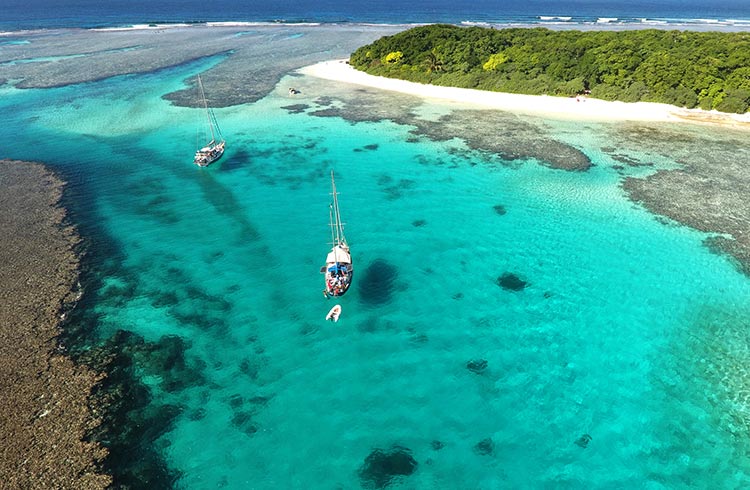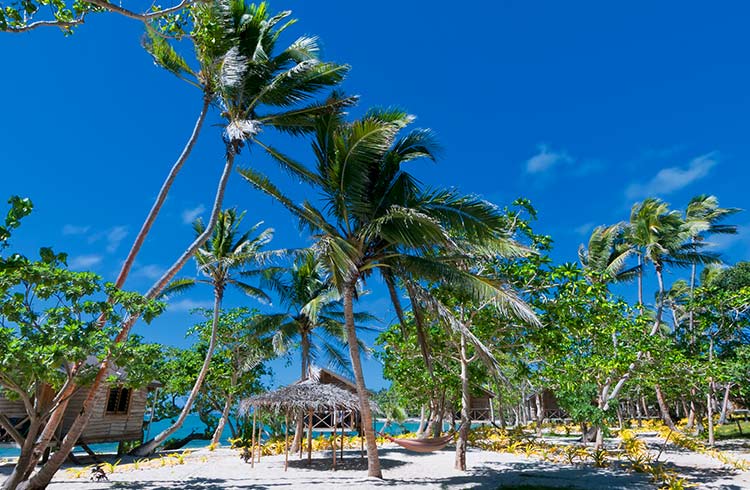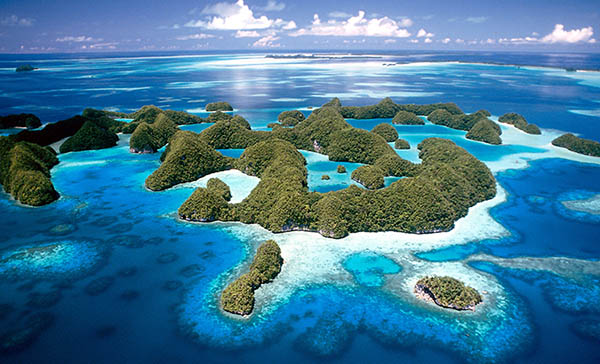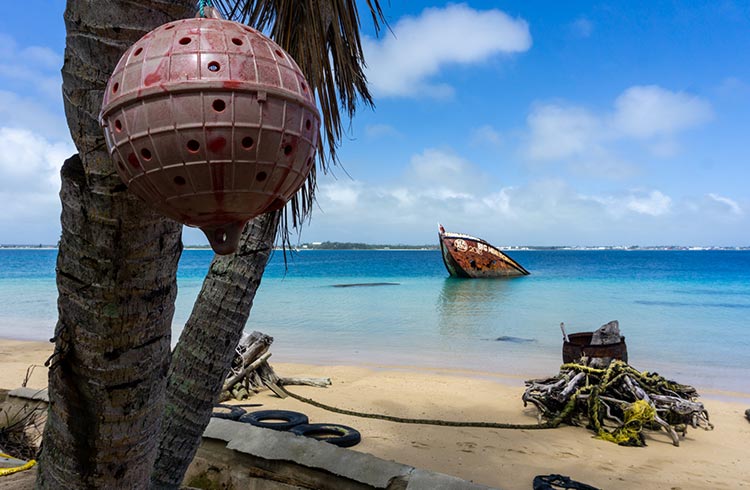Is Tonga Safe? 9 Travel Tips to Know Before You Go
How safe is Tonga for travelers? Find out about island crime, local laws, natural dangers and travel hygiene tips to stay safe.
 Photo © Getty Images/Susanne Michaela Huss
Photo © Getty Images/Susanne Michaela Huss
The Pacific island nation of Tonga is an exciting destination to travel, especially for whale watchers.
With a relatively low crime rate and strict Christian beliefs, this is what travelers need to know to stay out of trouble.
Modesty and respect will go a long way in Tonga. Stay vigilant to protect yourself from any trouble, and find out how to avoid offending the locals with these tips.
Theft and petty crime in Tonga
Petty crime and theft can occur in Tonga. Common sense and the usual travel precautions of securing valuables and not flashing desirable items around should be enough to keep you safe.
Home invasions and property theft are an issue, so keep your doors and windows locked when you leave your accommodation.
Violent robberies are rare, however use caution when walking around at night. Travel in groups and avoid isolated areas and suspicious people.
Sexual assault involving travelers is rare, but has been reported in areas including public beaches. Women travelers should travel in groups at night, and avoid secluded beaches while alone.
Local customs in Tonga
Be more aware of local customs than alert for criminal behavior in Tonga. Society is religious in Tonga, and most people are very conservative.
While Tongans are very friendly people, they are more reserved than people you may have met on other nearby Pacific Island nations.
Take extra care to learn about social etiquette cues, and always do your best to engage politely without offending.
Homosexuality is illegal in Tonga, and even a simple display of affection between same-sex couples could lead to trouble. The law isn't necessarily enforced, however you will likely get unwelcome attention and treatment. Do your best to keep public displays of affection private – and that goes for heterosexual couples, too.
Dress modestly in Tonga
Dress in a conservative manner while traveling around Tonga, by wearing modest clothing that covers the shoulders and knees and not showing off cleavage.
Wearing all black means you are in mourning, and it is considered disrespectful by the Tongans to wear this if you are not grieving.
Pack a conservative bathing suit if you plan to go swimming at public beaches, and you should never go topless. You can wear whatever you like if you are staying at a resort. Men also should not take their shirts off unless they are at a resort.

Businesses are closed on Sundays
Many travelers have learned to their dismay that Tonga's strict Sabbath observance means many business are closed on Sundays. Sunday prayers are practiced by the majority of the island's inhabitants and this observance extends to restaurants, cafes and pubs in addition to sporting events and leisure activities like snorkeling. Even exercising is considered illegal on Sunday, unless you are, once again, staying on a resort.
Drugs and drinking kava
Unsurprisingly, drugs are illegal in Tonga, and any import or export can get you up to 30 years – yes, you read that number right – in prison or a hard labor camp and/or a several hundred thousand dollar fine. Those who grow or sell drugs can face similar penalties. Know that at least these laws don't apply to the local drink Kava, which is said to have a narcotic effect.
Cyclones and earthquakes in Tonga
Tonga is an island nation in the Pacific, and is prone to several forms of natural disaster. It does sit on an active earthquake zone, but normally only ever experiences minor tremors. The earthquake zone does mean tsunamis are more frequent here.
In September 2009, these deadly forces met when an earthquake near Samoa triggered a tsunami that made landfall on Tonga, resulting in nine deaths.
Cyclones also can happen in Tonga, and cyclone season usually runs from November to April, though these weather events can happen in other months, too. During these storms, flooding and severe winds can occur, and power and transportation service may cease.
Swim safely in Tonga
Even if you are a strong swimmer, do not get too confident on the beaches of Tonga. There are coral reefs that are particularly sharp in Tongatapu and Pangaimotu. Strong rip currents can endanger even the best swimmers. Fatalities have occurred in the past here due to strong currents.
Certain spots are more hazardous than others, and it is advisable to ask locals where these locations are.
Jellyfish stings can occur in the waters around Tonga due to bluebottles (also known as the Indo-Pacific 'Man o' War'). If you are stung, ask for an ice pack or apply vinegar to the sting – do not use alcohol.
Wildlife dangers in Tonga
Sea snakes are present in Tonga's waters, but are unlikely to attack. Poisonous cone shells near coral reefs can sting you and, in severe cases, lead to fainting and trouble breathing.
On land, there are other critters than can string you, such as the Molokai, or centipede, which likes to crawl into shoes. Check your shoes before putting them on if they have been sitting outside.
Wild dogs roam the islands, and are usually safe when alone, but can be aggressive in packs. Pretending to throw a stone at the pack of dogs to distract them (but don't actually throw anything to harm the animal).
Stay healthy and avoid getting sick
Beyond the normal list of island sicknesses, there isn't much to worry about in Tonga. Check with your travel doctor before you go for the most relevant list of vaccinations and booster shots that you may require – and aim to visit your doctor at least eight weeks before departure.
Dengue fever is a risk in Tonga, and to avoid this travelers should always protect themselves from mosquito bites. Try to wear long-sleeved clothing at night, wear insect repellent at dawn and dusk when mosquitoes are most active, and avoid leaving windows open while sleeping.
Ciguatera poisoning is unpredictable, and can affect what is usually a safe and edible fish in most other countries. It happens most often in meat-eating reef fish, such as red snapper, Spanish mackerel, or barracuda and moray eels. When you're searching for seafood on the menu, perhaps avoid ordering a dish containing these types of fish. There is no way to identify if ciguatera is present, until you fall ill with an upset stomach, itching, feeling feint, a slow pulse or a temperature.
The water in Tonga can be unpredictable. It's best to ask your hotel or restaurant if they use filtered water. Sometimes they'll use collected rain water, which can pose problems.
Use caution when eating anything containing fresh produce such as salads, and when preparing your own food, peel all fruits and vegetables before eating. Stick to food that is cooked and served hot to avoid contamination.
Related articles
Simple and flexible travel insurance
You can buy at home or while traveling, and claim online from anywhere in the world. With 150+ adventure activities covered and 24/7 emergency assistance.
Get a quote

6 Comments
hi there just curious, Can you lay a complaint with Tongan police from Tonga to a member from New Zealand?
Interesting! Add this also. If you are a foreigner, and hungry ... look for a church or a priest and ask them ... honesty is better. and if too faraway, ask the ladies or couples walking by they will assist you if you are hurt and hungry in Tonga. Never approach drunken group ... they may help but mostly aggressive if they are sad or unhappy. stick to happy crowd and take care
thank you
More cattle are being raised, and beef imports are declining. Tonga's development plans emphasize a growing private sector, upgrading agricultural productivity, revitalizing the squash and vanilla bean industries, developing tourism, and improving the island's communications and transportation systems.
Be careful not too leave valuables in a self contained house that is securely locked, fenced with barbed wire, padlocked and has bars on the windows. We were lulled into a sense of security and had thieves break open the bars on the windows, rip the fly screens off and break the window ledges to get in. It was daytime. We learnt a hard lesson in Tonga.
Let me just have you know that I have been in Tonga residing in a village called vaini for 3 months and the experience has been nothing but amazing.
I orginated from Australia so yes the standards are way different yet Tongan lifestyle, just the simplicity of living attract my attention with it being more peaceful then anywhere i have been.
Like anywhere there are good and bad in people but majority of the people here are fun loving, helpful and funny you just have to learn their way and the way of the country.
Trust them but trust yourself more and everything will be just fine and if worse comes to worse get yourself a good friendly interpreter or translater and i found a great one who speaks both tongan and english exceptionally well and has allowed me to pass on her details.
Ana Sin'elVaini : 7705509
'You should almost dress as you would in a heavily Muslim country'..I wouldn't go that far, you can wear sleeveless tops and dresses in public, also short denim or cargo shorts, just nothing too flashy like a mini skirt, thin strap crop top.. you get the idea. It's just for modesty and respect but don't stress too much if your sundress is 2cm's above your knee :P
I grew up in Tonga and although there are some truths in this article, it should also be taken with a grain of salt.
-It is a predominantly Christian island but you won't have locals pestering you with their beliefs. If anything, i suggest visiting a local church on Sunday just to see and hear the beauty of the choir and service. It really is unique. Hop on a boat after church from the wharf to one of the islands close by, have a late lunch and swim then head back all before sunset.
-Tongans are very easy going, humorous people. If you encounter a drunk group and they say something cheeky, feel free to give a cheeky witty response back, laugh and be on your way. Chances are they will appreciate the humour and laugh too, not bothering you much further. If you are in the bars and same things happen, remember they are flirtatious and cheeky by nature, don't take it too seriously. If you feel uncomfortable, let the security know, he will handle it for you.
-' Because of its religious society, most people in Tonga are very, very conservative. Some more extreme Christian groups exist including Mormon, Seventh-day Adventists and Assemblies of God'... I wouldn't use *very very* conservative and *extreme* Christian groups here..I mean, yes Tongans can be conservative and yes there are Christian groups but don't let that give you the wrong impression. Tongans won't harass you on the street for wearing clothes that aren't deemed modest and they certainly won't judge you or try and convert you into a Christian. If anything, they are *very very* hospital and friendly people. You will know what I mean when and if you go there :) One of the few places were you can feel safe hitch hiking, and that says a lot.
-Again, if wearing all black is your style, locals won't feel disrespected even though it is a colour worn during mourning. Locals understand that you are a tourist/traveller. They do not expect you to know our customs. Anyway, it's a hot a humid island, wearing black will be totally uncomfortable in the heat so bear that in mind.
-Businesses are closed on Sundays so be prepared and buy things you need on the saturday. Some Chinese restaurants are open as are some resorts that serve food. The islands close by (that you can catch a boat to from the wharf) are also open on Sunday. You won't starve. If however, you want to try local food. Go to church on Sunday morning and make some friends or strike up a conversation with someone you are sitting next to, tell them you would love to try local food and I am sure you will be happily invited back to their house for lunch. More likely if its a woman ( the men can be shy). If offered, do accept, it will be a great experience and you will live to tell the tale. Also, it is safe to do so, Tongans are very hospitable and make friends quickly. They will be glad to have a guest for lunch.
-Petty crime does happen. Unemployment among youth is rather high and this leads to delinquent behaviour. Just keep an eye on valuables you have and don't be careless. Locals, especially elderly and older locals don't appreciate and tolerate petty crime so if a person runs off with your purse, phone etc. yell out and tell another local immediately. They will most likely run after the person or make a scene and the culprit will be caught soon. Everyone knows every one on the island. Locals are embarrassed and empathetic when petty crime and theft happen to foreigners. If you are ever a victim, report it and let others know.
-Yes, don't deal with drugs on the Island, don't bring it with you, don't buy it, sell it, use it etc..it is not worth it, ever. You will realise authorities have no remorse if you are caught. Kava on the other hand, feel free to enjoy. If you ever happen to walk past a hall building next to a church with a group on men sitting around the circle, ask to join in and they will gladly accept. Feel free to buy some candy at the local convenient store to share at the kava circle, the sweet taste is nice as kava can have an unpleasant taste.
Lastly, enjoy! Don't stress too much and make some great memories! :)